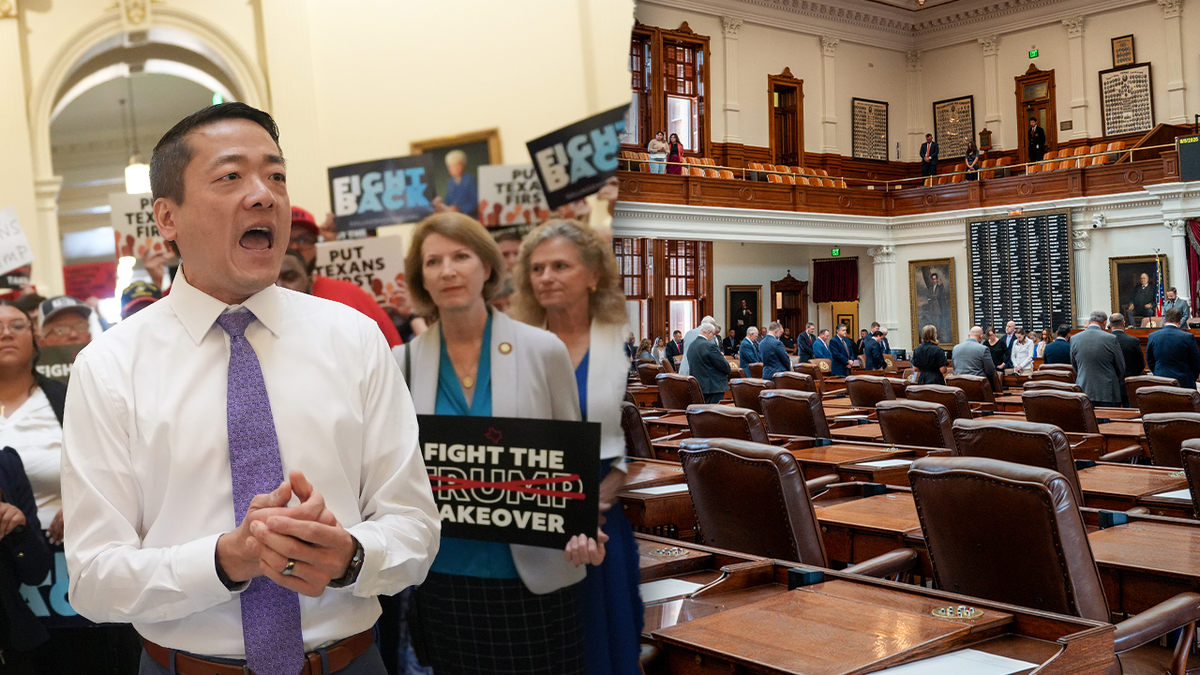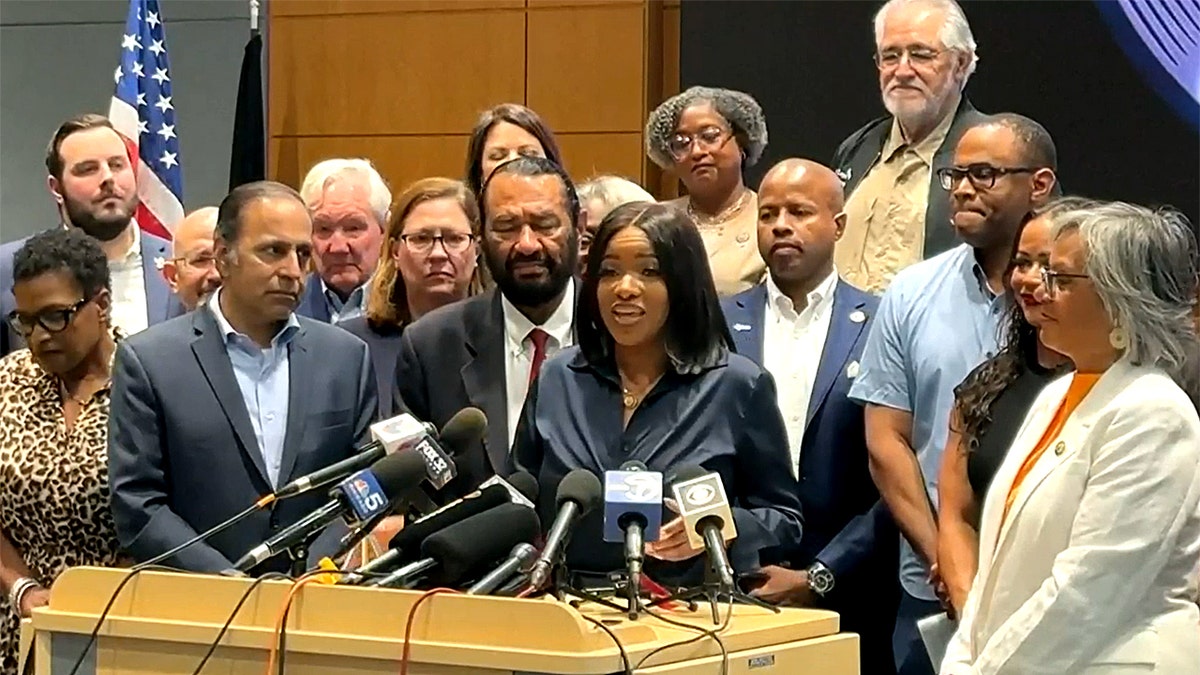

If you wanted a case study in why so many Americans believe the system is rigged, you couldn’t script it better than what’s happening in Texas right now.
Democrats have fled the state to block a Republican redistricting plan that could lock in GOP control of up to five more congressional seats. In response, Republicans are threatening arrest warrants, expulsion, and even calling in the FBI to force lawmakers back to work. The clock is ticking on a legislative deadline — and an even bigger one in December, when candidates must file to run in 2026.
But in all this high-stakes political theater, one thing is missing: the voter.
TEXAS RESIDENTS SAY ‘THERE SHOULD BE CONSEQUENCES’ FOR DEMS FLEEING STATE TO AVOID VOTE
Ask the average Texan what they want from their leaders, and you won’t hear "a partisan brawl over district lines." You’ll hear "lower grocery bills," "affordable housing, and "a plan to get property taxes under control."

A split photo of Rep. Gene Wu, D-Houston, right, next to a photo of a nearly empty Texas House of Representatives in Austin, Texas. Democrats fled the state in August in an effort to block Gov. Greg Abbott's attempt at redistricting. (Photos via Getty Images)
Yet in Austin, the oxygen is being sucked up by a story that’s all about process and power. Republicans talk about enforcing quorum rules and fulfilling their mandate. Democrats talk about protecting voting rights and standing against an unfair map. Both are speaking to the political class — not to the families trying to figure out how to pay for back-to-school clothes.
When voters see politicians locked in a fight that doesn’t touch their daily lives, it feeds a familiar, corrosive belief: the system works for the people in power, not for them.
OBAMA LABELS TEXAS REDISTRICTING PUSH 'A POWER GRAB THAT UNDERMINES OUR DEMOCRACY'
Here’s the truth about gerrymandering: it starts with neutral census data, but the way you slice it determines who holds power. Both parties have done it. Both have justified it when it worked in their favor. And both have cried foul when it didn’t.
For voters, that’s Exhibit A in the case that politicians play by their own set of rules. When you can essentially choose your own voters, accountability goes out the window. Safe seats mean you can ignore the issues that matter most — cost of living, health care, jobs — and still keep your job.
It’s no wonder 78% of Americans in a recent poll say CEOs and political elites play by a different set of rules, or that nearly half believe the entire economic system is rigged against them. The Texas spectacle just adds more evidence.
Both sides could be tying this fight to something voters actually feel.
TEXAS DEMS ALSO SKIPPED TOWN IN 2021 TO AVOID A VOTE, AND SEVERAL CAUGHT COVID-19 IN DC
Republicans could say: "Fair maps mean we can focus on lowering your cost of living instead of endless political fights."
Democrats could say: "Unfair maps mean politicians don’t have to care about your bills, your schools, or your safety."

Texas Democrats stood next to Illinois lawmakers on Aug. 4, 2025, to oppose redistricting measures proposed by Texas Republicans. (Fox News)
Instead, both have made this a referendum on their own courage and legitimacy. That’s fine for donor emails and activist rallies. But for the median voter, it’s just more proof that politicians are obsessed with their own turf wars while ignoring kitchen-table issues.
The poll tells us something crucial: voters are angry at both parties. Trump’s approval is still underwater. Democrats’ favorability is at its lowest level in decades. And inflation, tariffs and economic concerns remain top-of-mind.
TEXAS DEMOCRATS FLEE STATE TO BLOCK TRUMP-BACKED REDISTRICTING VOTE IN DRAMATIC LEGISLATIVE MOVE
In that environment, anything that makes you look out-of-touch is dangerous. For Democrats, the risk is that walking out over redistricting looks like playing procedural games instead of delivering results — especially in a state where they already face skepticism about their competence. For Republicans, the risk is that pushing an aggressive gerrymander reinforces the perception they care more about holding power than solving problems.
Either way, it’s a messaging disaster: both sides walk away looking like they’re fighting for themselves, not for the people who sent them there.
This Texas fight is a vivid example of a broader fairness problem in American politics.
Voters believe — and with good reason — that the rules are written to favor a few insiders. Whether it’s a district map, a campaign finance loophole or a late-night procedural maneuver, the perception is the same: the powerful look out for themselves first.
And the more that perception hardens, the harder it is for either party to credibly claim they’re on the side of the people. That’s why "lesser of two evils" voting has become so entrenched. People don’t think anyone is actually fighting for them — they’re just choosing who they think will do the least harm.
Real leadership in this moment would mean breaking out of the process bubble. If you’re going to talk about redistricting, tie it to something tangible:
Either way, it’s a messaging disaster: both sides walk away looking like they’re fighting for themselves, not for the people who sent them there.
That’s how you connect a fight over district lines to the thing voters care about most: their own lives.
Until someone reframes this fight in voter-first terms, it’s going to remain exactly what it looks like now: a political brawl that changes nothing for the average Texan. Both sides will claim the moral high ground. Both will raise money. And both will walk away with a little more distrust from the people they’re supposed to represent.
The Texas standoff isn’t just a procedural battle — it’s a missed chance to show voters that politicians can still fight for something other than themselves. And if the polls tell us anything, it’s that Americans are running out of patience.
